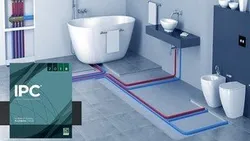
Plumbing System Design Basics (MEP) 
This course provides an introduction to the basics of plumbing system design, including an overview of IPC standards. Participants will gain a comprehensive understanding of the fundamentals of plumbing system design. ▼
ADVERTISEMENT
Course Feature
![]() Cost:
Cost:
Free
![]() Provider:
Provider:
Udemy
![]() Certificate:
Certificate:
Paid Certification
![]() Language:
Language:
English
![]() Start Date:
Start Date:
On-Demand
Course Overview
❗The content presented here is sourced directly from Udemy platform. For comprehensive course details, including enrollment information, simply click on the 'Go to class' link on our website.
Updated in [March 06th, 2023]
This course, Plumbing System Design Basics (MEP), provides an overview of plumbing system design basics with IPC Standards. Participants will learn the fundamentals of plumbing system design, including reading architecture layouts, plumbing fixtures, water side equipment, pipe fittings and accessories, and more. Topics covered include building services, standard society, why plumbing codes, why plumbing systems, transfer pumps, booster pumps, hot water circulation pumps, air compressors, dishwashers, heaters, electric water heaters, gas water heaters, pipe fittings, accessories, valves, pressure reducing valves, water hammer resistors, strainers, float valves, foot valves, flexible connections, automatic air vents, pressure gauges, NRV, and more. Upon completion of this course, participants will have a better understanding of plumbing system design basics and IPC Standards.
[Applications]
Upon completion of this course, students will have a comprehensive understanding of plumbing system design basics and IPC standards. They will be able to design and install plumbing systems in residential, commercial, and public settings. Students will also be able to identify and use various plumbing fixtures, water side equipment, pipe fittings, and accessories. Additionally, they will be able to troubleshoot and repair existing plumbing systems. With the knowledge gained from this course, students will be well-equipped to pursue a career in plumbing.
[Career Paths]
Recommended Career Paths:
1. Plumbing System Design Engineer: Plumbing System Design Engineers are responsible for designing and installing plumbing systems in residential, commercial, and public settings. They must be knowledgeable in the latest plumbing codes and regulations, as well as the latest technologies and materials used in plumbing systems. This job is expected to grow in demand as the population increases and more buildings are constructed.
2. Plumbing Inspector: Plumbing Inspectors are responsible for ensuring that all plumbing systems are installed and maintained according to the latest codes and regulations. They must be knowledgeable in the latest plumbing codes and regulations, as well as the latest technologies and materials used in plumbing systems. This job is expected to grow in demand as the population increases and more buildings are constructed.
3. Plumbing Contractor: Plumbing Contractors are responsible for installing and maintaining plumbing systems in residential, commercial, and public settings. They must be knowledgeable in the latest plumbing codes and regulations, as well as the latest technologies and materials used in plumbing systems. This job is expected to grow in demand as the population increases and more buildings are constructed.
4. Plumbing Technician: Plumbing Technicians are responsible for troubleshooting and repairing plumbing systems in residential, commercial, and public settings. They must be knowledgeable in the latest plumbing codes and regulations, as well as the latest technologies and materials used in plumbing systems. This job is expected to grow in demand as the population increases and more buildings are constructed.
[Education Paths]
Recommended Degree Paths:
1. Plumbing Engineering: Plumbing engineering is a specialized field of engineering that focuses on the design, installation, and maintenance of plumbing systems. This degree path provides students with the knowledge and skills needed to design, install, and maintain plumbing systems in residential, commercial, and public settings. It also covers topics such as plumbing codes, water systems, pipe fittings, and accessories. This degree path is becoming increasingly popular as the demand for plumbing services continues to grow.
2. Plumbing Technology: Plumbing technology is a specialized field of study that focuses on the installation and maintenance of plumbing systems. This degree path provides students with the knowledge and skills needed to install and maintain plumbing systems in residential, commercial, and public settings. It also covers topics such as plumbing codes, water systems, pipe fittings, and accessories. This degree path is becoming increasingly popular as the demand for plumbing services continues to grow.
3. Construction Management: Construction management is a specialized field of study that focuses on the planning, organizing, and managing of construction projects. This degree path provides students with the knowledge and skills needed to plan, organize, and manage construction projects. It also covers topics such as construction codes, construction materials, and construction methods. This degree path is becoming increasingly popular as the demand for construction services continues to grow.
4. Building Science: Building science is a specialized field of study that focuses on the design, construction, and maintenance of buildings. This degree path provides students with the knowledge and skills needed to design, construct, and maintain buildings. It also covers topics such as building codes, building materials, and building methods. This degree path is becoming increasingly popular as the demand for building services continues to grow.
Pros & Cons

Good, Love the matter of Fact style, Good information and examples, Clear explanation, Gained a lot from experience and teaching.

Wasting time, No system design explained, Not matching course title.
Course Provider

Provider Udemy's Stats at AZClass
Plumbing System Design Basics introduces the fundamentals of piping system design, including an overview of IPC standards. Participants will gain a thorough understanding of the fundamentals of piping system design. Students can learn the fundamentals of piping system design including the use of IPC standards, building services, standards associations, and piping codes. They can also learn about different types of plumbing fixtures. They can also learn about pipe fittings and accessories such as elbows and tees and reducers, crosses, and more.
Discussion and Reviews
0.0 (Based on 0 reviews)
Explore Similar Online Courses

Recharge Your Creativity: 5 Techniques to Grow Your Sketching Skills with Markers

Program Resource Planning with ClickUp

Python for Informatics: Exploring Information

Social Network Analysis

Introduction to Systematic Review and Meta-Analysis

The Analytics Edge

DCO042 - Python For Informatics

Causal Diagrams: Draw Your Assumptions Before Your Conclusions

Whole genome sequencing of bacterial genomes - tools and applications

Forklift Operation Safety

Using Telehandlers


Start your review of Plumbing System Design Basics (MEP)